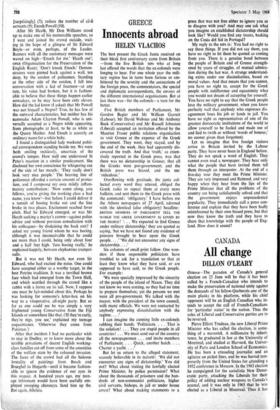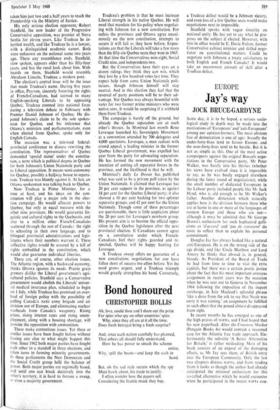. All change
CANADA DILLON O'LEARY
Ottawa—The paradox of Canada's general election on 25 June will be that it has been called by a French-Canadian who intends to make the preservation of national unity against the demands of his fellow-Quebecois one of the main planks in his platform, while his chief opponent will be an English Canadian who in- tends to accept the call of French-Canadians for 'particular status' in the nation. Thus the roles of Liberal and Conservative parties are to be reversed.
Pierre Elliott Trudeau, the new Liberal Prime Minister who has called the election, is some- thing of a maverick. A millionaire by inheri- tance, he graduated in law at the University of Montreal, and studied at Harvard, the Univer- sity of Paris and London School of Economics. He has been a crusading journalist and an agitator on picket lines, and he was barred tem- porarily from the United States for attending a 1952 conference in Moscow. In the 1963 election he campaigned for the socialistic New Demo- cratic party, attacking the Liberals for their policy of adding nuclear weapons to Canada's arsenal, and it was only in 1965 that he was elected as a Liberal in Montreal.' Thus it has taken him just two and a half years to reach the Premiership via the Ministry of Justice.
His only serious election opponent,--Robert Stanfield, the new leader of the Progressive Conservative opposition, was premier of Nova Scotia for eleven years. Like Trudeau he in- herited wealth, and like Trudeau he is a lawyer, with a distinguished academic career. Both were unknown on the national scene two years ago. There any resemblance ends. Stanfield, slow spoken, appears older than his fifty-four years, and has the rural look about him. With beards on them, Stanfield would resemble Abraham Lincoln, Trudeau a modern poet.
The election's central issue will be the issue that made Trudeau's name. During five years in office, Pearson, sincerely fostering the rights of French-Canadians, had seemed to many English-speaking Liberals to be appeasing Quebec. Trudeau zoomed into national focus during a television debate in February with Premier Daniel Johnson of Quebec. He dis- puted Johnson's claim to be the sole spokes- man for Quebec, and his inference that Ottawa's ministers and parliamentarians, even when elected from Quebec, spoke only for English Canada.
The occasion was - a televised federal- provincial conference to discuss rewriting the constitution. The representatives of Quebec demanded 'special status' under the constitu- tion, a term which is political dogma in Quebec for both Johnson's Union Nationale party and its Liberal opposition. It means semi-autonomy for Quebec, possibly a halfway house to separa- tism. Trudeau was bluntly against it. At last, an Ottawa spokesman was talking back to Quebec.
Now Trudeau is Prime Minister, for a time at least, and his ideas on the con- stitution will play a major role in the elec- tion campaign. He would allocate powers to Quebec, but only in equal measure with the other nine provinces. He would guarantee lin- guistic and cultural rights to the Quebecois, and also to a million other French-Canadians scattered through the rest of Canada : the right to schooling in their own language, and to bilingual provincial administrations and legis- latures where their numbers warrant it. These collective rights would be assured by a bill of rights embedded in the constitution, which would also guarantee individual liberties.
There are, of course, other election issues. The Atlantic region, with a backward economy, thinks Ottawa ignores its needs. Prairie grain growers dislike the Liberal government's agri- cultural policies. Stanfield says a Conservative government would abolish the Liberals' univer- sal medical insurance plan, scheduled to begin on 1 July, while Trudeau has promised an over- haul of foreign policy with the possibility of pulling Canada's NATO army brigade and air division out of Europe, and eliminating nuclear warheads from Canada's weaponry. Rising prices,_ rising interest rates and rising unem- ployment, along with a housing shortage, will provide the opposition with ammunition.
These make contentious issues. Yet these or similar issues have been fought before without leaving any clue to what might happen this time. Since 1962 both major parties have fought each other to a standoff in three elections, and taken turns in forming minority governments. In these parliaments the New Democrats and the Social Credit group herd the balance of Power. Both major parties are regionally based, and until one–can break decisively into the other's territory, it is hard to foresee a sweep, or even a majority government.
Trudeau's problem is that he must increase Liberal strength in his native Quebec. He will need that mandate for his policy when negotiat- ing with Johnson for a new constitution. For unless the provinces and Ottawa agree unani- mously on the new constitution, attempts to secure it will fail as they have before. Expec- tations are that the Liberals will take a few more than the fifty-six Quebec seats they won in 1965. At that time the Conservatives won eight, Social Credit nine, and independents two.
But the Conservatives have their eyes on a dozen ridings they think they can win, which they lost by a few hundred votes last time. They expect help from some Union Nationale poli- ticians, though Johnson himself will stay neutral. And in this election they feel that the reversal of party positions will be to their ad- vantage. Yet Quebec was always bountiful with votes for two former prime ministers who were native sons. It would be surprising if it withheld them from Trudeau.
The campaign is barely off the ground, but already the Quebec separatists are at each other's throats. In Montreal last month Rene Levesque launched his Sovereignty Movement • at a convention attended by 700 delegates and 4,000 spectators. Levesque, a man radiant with crowd appeal, a leading minister in the former Quebec Liberal government, was expelled last year from the party for advocating separatism. He has formed the new movement with the intention of uniting all separatist forces in the province, and the likelihood is that he will.
Montreal's daily Le Devoir has published what was said to be a private poll taken by the Union Nationale. It claimed that Levesque has 20 per cent support in the province, as against 18 per cent for the Quebec Liberal party; it also showed a 10 per cent backing for two splinter separatist groups, and 42 per cent for the Union Nationale. Though some of these percentages are questionable, there is little scepticism about the 20 per cent for Levesque's newborn group. His present aim is to become the official oppo- sition in the Quebec legislature after the next provincial election. If Canadians cannot agree on a constitution under which French- Canadians feel their rights guarded and re- spected, Quebec will be happy hunting for Levesque.
A Trudeau sweep offers no guarantee of a new constitution; negotiations for one have fallen short of success too often before. Yet the need grows urgent, and a Trudeau triumph would greatly strengthen his hand. Conversely, a Trudeau defeat would be a Johnson victory, and even loss of a few Quebec seats would make negotiations next to impossible.
Stanfield speaks with ' vague sincerity on national unity. He has yet to say what he pro- poses on the subject if elected. However, with him in office would be E. Davie Fulton, former Conservative cabinet minister and skilled nego- tiator on constitutional matters. Could he negotiate with Johnson a treaty satisfactory to both English and French Canada? It would take an uncommon amount of skill after a Trudtau defeat.







































 Previous page
Previous page